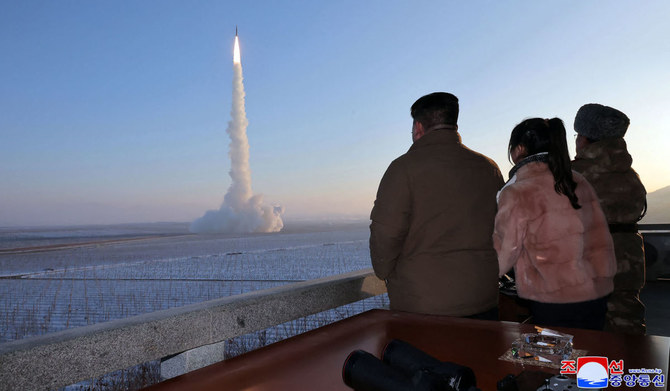SEOUL: North Korea said on Tuesday it had launched a Hwasong-18 intercontinental ballistic missile (ICBM) on Monday as a drill to confirm the war readiness of its nuclear deterrence force in the face of mounting hostility by the United States.
State news agency KCNA said the country’s leader Kim Jong Un watched the launch of the ICBM at the site. The missile reached the altitude of 6,518 km (4,050 miles), flying 1,002 km (623 miles) and accurately hitting the intended target, KCNA said.
Kim said the launch sends “a clear signal to the hostile forces, who have fanned up their reckless military confrontation hysteria” against the North throughout the year, KCNA said.
The agency said the drill “displayed the DPRK’s will for toughest counteraction and its overwhelming strength.” DPRK is short for the Democratic People’s Republic of Korea.
He presented “some new important tasks for accelerating the development of the DPRK’s nuclear strategic forces,” KCNA said without elaborating.
“The US imperialists and their vassal forces’ vicious ambition for confrontation will not abate of its own accord, he said, stressing the need for the DPRK to never overlook all the reckless and irresponsible military threats of the enemies.”
South Korea and Japan said on Monday the North had fired an ICBM with a range to hit anywhere in the United States.
On Sunday, it condemned a US military show of force including the arrival of an aircraft carrier and nuclear-powered submarine in South Korea as “war” moves, and fired a short-range ballistic missile into the sea off its east coast.
South Korea said the missile fired on Monday was a solid-fuel Hwasong-18 ICBM. It flew in a sharply lofted trajectory landing in the sea west of Japan’s Hokkaido island.
North Korea’s state media published what it said were photographs of the launch, showing the missile blasting off from a snow-covered field trailing a plume of smoke.
The ICBM’s lofted trajectory and the 74-minute flight time are compatible with an operational range of up to 15,000 km (9,300 miles) if launched at a flatter, standard trajectory, which puts all of the mainland United States within reach.
North Korea also criticized a high-level meeting between US and South Korean officials last week where upgraded responses to nuclear threats and joint military drills were discussed, saying it stoked confrontation on the Korean peninsula.
The United States continued to demonstrate a confrontational attitude by bringing in nuclear-powered submarines, strategic bombers and an aircraft carrier near the Korean peninsula, it said.
The US nuclear-powered submarine Missouri arrived in the South Korean port of Busan on Sunday, the latest US strategic military asset to be deployed as part of Washington’s pact with Seoul to boost defense readiness.
The United States and South Korea have increased the intensity of joint military drills against rising threats from the North, which has tested a range of ballistic missiles and in November launched its first military spy satellite.


























